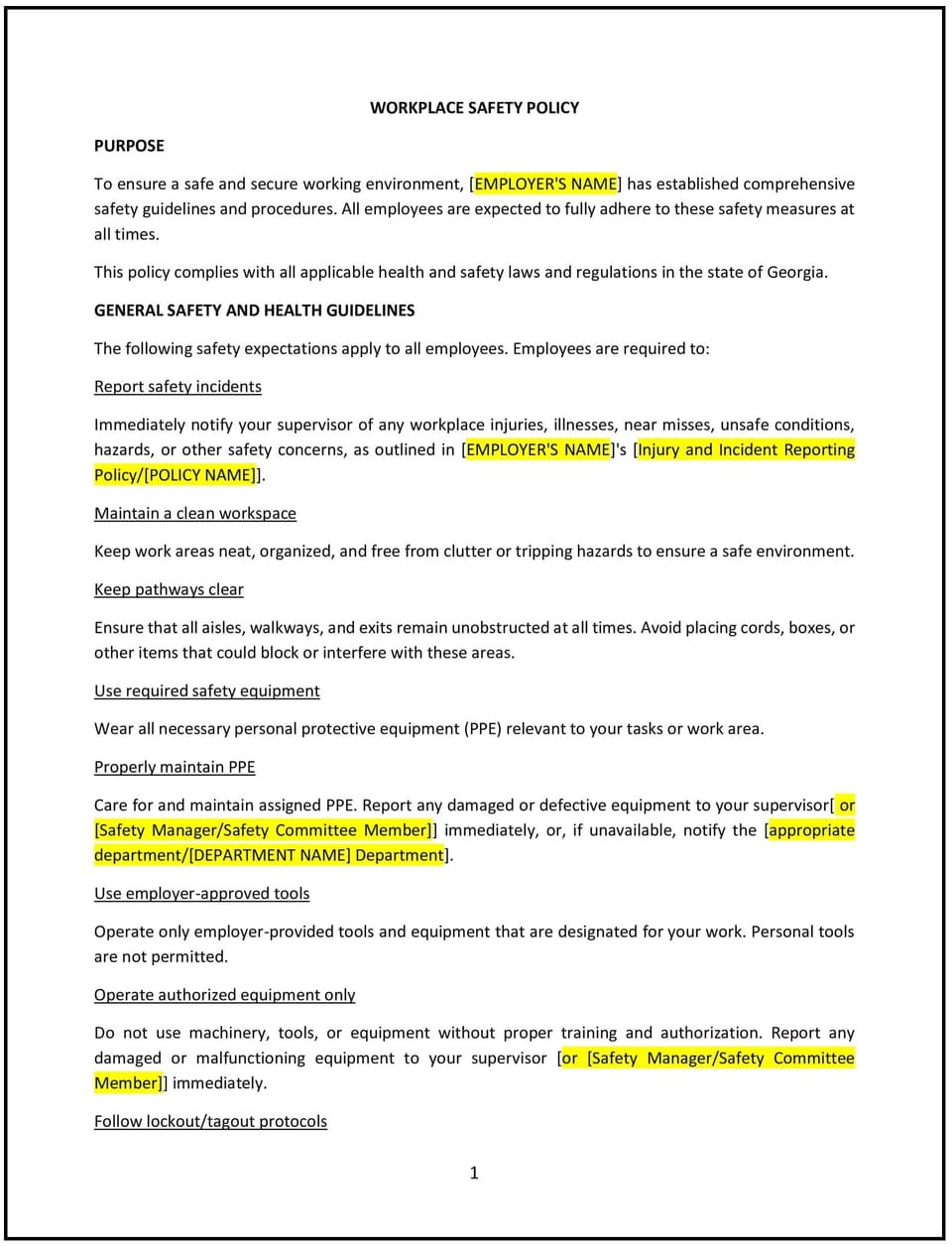Workplace safety policy (Georgia): Free template

Workplace safety policy (Georgia)
This workplace safety policy is designed to help Georgia businesses promote a secure and healthy work environment. The policy outlines safety expectations, reporting procedures, and preventative measures to reduce risks and protect employees, customers, and visitors.
By implementing this policy, businesses can create a culture of safety, minimize hazards, and maintain operational efficiency.
How to use this workplace safety policy (Georgia)
- Define safety expectations: Clearly outline responsibilities for employees, supervisors, and management in maintaining workplace safety.
- Identify workplace hazards: Conduct regular assessments to identify potential risks specific to the business and industry.
- Provide safety training: Offer ongoing education on safety procedures, equipment use, and emergency response.
- Establish reporting procedures: Encourage employees to report hazards, incidents, or near-misses promptly and confidentially.
- Develop emergency plans: Include detailed instructions for handling emergencies, such as evacuations, fires, or medical crises.
- Maintain equipment and facilities: Ensure all machinery, tools, and workspaces are regularly inspected and properly maintained.
- Review regularly: Periodically assess and update the policy to reflect changes in Georgia-specific regulations, industry standards, or workplace conditions.
Benefits of using this workplace safety policy (Georgia)
Implementing this policy provides several advantages for Georgia businesses:
- Reduces accidents: Proactive measures and training minimize the likelihood of workplace injuries.
- Builds employee confidence: A clear commitment to safety fosters trust and engagement among employees.
- Enhances productivity: A safe environment enables employees to focus on their tasks without unnecessary risks.
- Supports risk management: Structured safety practices help businesses address potential liabilities effectively.
- Reflects Georgia-specific practices: Tailoring the policy to local industries and business needs ensures relevance and practicality.
Tips for using this workplace safety policy (Georgia)
- Communicate clearly: Share the policy with employees during onboarding and provide regular updates as needed.
- Involve employees: Encourage workers to participate in safety initiatives and share feedback on potential improvements.
- Monitor compliance: Regularly inspect workspaces and track adherence to safety protocols.
- Recognize safe behavior: Reward employees or teams that demonstrate a commitment to safety practices.
- Collaborate with experts: Consult with safety professionals to ensure the policy reflects best practices for your industry.
Q: What are employees’ responsibilities under this policy?
A: Employees should follow safety procedures, report hazards or incidents promptly, and participate in training programs.
Q: How should hazards or incidents be reported?
A: Employees should notify their supervisor or designated safety officer immediately, providing details about the issue or incident.
Q: What types of safety training should businesses provide?
A: Businesses should offer training on equipment use, emergency procedures, hazard identification, and industry-specific safety practices.
Q: How often should workplaces be inspected for hazards?
A: Businesses should conduct regular inspections, such as monthly or quarterly, and additional checks following incidents or changes in operations.
Q: What emergency plans should businesses have in place?
A: Emergency plans should include evacuation procedures, fire response, first aid instructions, and contact information for emergency services.
Q: How can businesses encourage employees to prioritize safety?
A: Businesses should promote a culture of safety through training, open communication, recognition programs, and by addressing hazards promptly.
Q: How often should this policy be reviewed?
A: The policy should be reviewed annually or as needed to reflect changes in Georgia workplace practices or industry standards.
This article contains general legal information and does not contain legal advice. Cobrief is not a law firm or a substitute for an attorney or law firm. The law is complex and changes often. For legal advice, please ask a lawyer.


